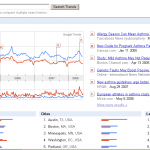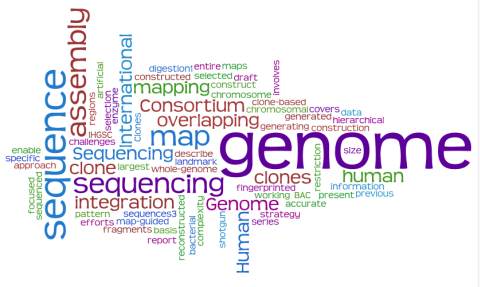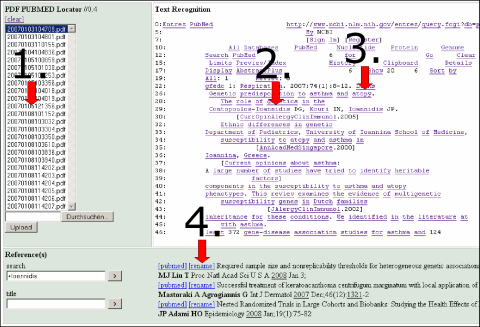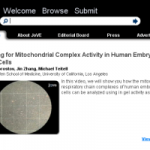 Besides traditional and expensive epidemiological studies to compare disease prevalence over time, the net offers also some nice research tools – click on the thumbnail to see Google asthma trend results by today. The query counts are largely consistent with most recent scientific papers seeing the asthma epidemic now at a (high) plateau. Did the environmental risk now saturate all individuals at risk?
Besides traditional and expensive epidemiological studies to compare disease prevalence over time, the net offers also some nice research tools – click on the thumbnail to see Google asthma trend results by today. The query counts are largely consistent with most recent scientific papers seeing the asthma epidemic now at a (high) plateau. Did the environmental risk now saturate all individuals at risk?
The best climbs
It is a fact that the best climbs are performed by famous mountaineers before they became famous (Doug Scott in “Mountain” according to an inscription at Firmian/Messner Mountain Museum). Continue reading The best climbs
Retire retirement
May 29, 2008 Nature has an interesting commentary by Peter Lawrence (66) about the archaic practice of retirement of active scientists at a determined age. It is a quite luxurious habit of “Doing what I like” while having a mostly pleasant life here on earth as a scientist, it may be a quite logical to prolong the scientific career.
Continue reading Retire retirement
German Human geneticist warns against personal genomics
Wolfram Henn, Vorsitzender der Kommission für Grundpositionen und ethische Fragen der Deutschen Gesellschaft für Humangenetik, warnt im Interview mit Technology Review (Ausgabe 07/08 […]) vor persönlichen Genomanalysen, die über das Internet angeboten werden. So bietet beispielsweise das Unternehmen 23andMe seit kurzem eine Genomanalyse für nur 999 Dollar an.
Welcome in the club! Just to let you know that 23andme has been stopped 2 days ago as reported by Spiegel magazine.
Déjà vu extended
Given my interest in strange phenomena leading to science misperception I wonder why I didn’t find this site earlier as it tells you also everything about Déjà Vu, Déjà Vécu, Déjà Visité, L’esprit de l’Escalier (comeback when it is too late), Capgras delusion (replaced friend), Fregoli delusion (same person appears in different bodies) and prosopagnosia (unable to recognize faces also known as myopia…). Yea, yea.
Visual experiments
Fund the best science, by the best scientists
Enhancing peer review is the main purpose of a new NIH website
there had been a pervasive sense that peer review service has become more of a chore than a stimulating and privileged experience. […] As we contemplated possible changes, we were guided by two fundamental principles. Continue reading Fund the best science, by the best scientists
Reading this blog will improve your academic skills
Aren’t hat good news being published by Science this week?
Process-specific training can improve performance on untrained tasks, but the magnitude of gain is variable and often there is no transfer at all. We demonstrate transfer to a 3-back test of working memory after 5 weeks of training in updating. The transfer effect was based on a joint training-related activity increase for the criterion (letter memory) and transfer tasks in a striatal region that also was recruited pretraining.
Continue reading Reading this blog will improve your academic skills
Hierarchical bounding boxes
Feed this paper at this site to get the following result

The many problems of GWAs
genetic-future has an excellent article why the recent genome scans failed (i) alleles with small effects? (ii) population differences? (iii) epistatic interactions? (iv) cnvs more relevant than snps? (v) epigenetic inheritance? (vi) disease heterogeneity? It is a thorough review better than everything Continue reading The many problems of GWAs
Science as crowdsourcing enterprise
A new First Monday issue deals with iStockphoto although I would like to put this on a science level Continue reading Science as crowdsourcing enterprise
Vitamin D: A 18%! reduction in early infant mortality
A study published earlier this year in the Lancet found a 18% reduction in mortality when women obtained supplements during pregnancy until 90 days post partum including additional 800 ug retinol, 200 IU vitamin D, 10 mg vitamin E, 70 mg ascorbic acid, 1.4 mg vitamin B1, 18 mg niacin, 1.9 mg vitamin B6, 2.6 ug vitamin B12, 15 mg zinc, 2 mg copper, 65 ug selenium and 150 ug iodine. Much of the effect will be due to the vitamin D supplementation Continue reading Vitamin D: A 18%! reduction in early infant mortality
PDF Pubmed Finder
As announced earlier this week, here is a first version of the PDF Pubmed Finder.The Finder helps to identify an unknown paper within seconds and rename it within milliseconds. Although the Finder consists of a single page only it uses several areas to update the data. I have written the code for my local installation but you may try it also online with your own PDFs either by uploading them with the available form or by appending the PDF URL to the Finder address http://wjst.de/pubmed/finder.php?http://medicine.plosjournals.org/test.pdf
The last method is certainly better as it can be used within a scripting environment; note that my domain may not retrieve a PDFs that you can see at your local computer. PDFs also need to have some inline text (run an OCR on scans before submitting them).

Here are some usage instructions: After selecting any article on the left (1.), clicking on relevant keywords (2., 3.) will lead to an immediate Pubmed search (4). Finish by clicking on “rename” or “Pubmed/Zotero” import of the correct reference. If your search doesn’t retrieve any useful hits, keywords will be automatically reset.
What I would like to know all from the AJAX experts who can inspect the sourcecode: I ran into deep problems described earlier with the prototype oncomplete function used in the links of the div2 container. They are checking how the div4 container was being updated. As you see it works, but I failed to clean up the code by having only one Javascript function in the beginning of the page with the div2 links calling this function. Your help would be greatly appreciated.
Winning ugly
It is my impression (and it may be wrong) while reading old Nature volumes that research a few decades ago has been done inter alia or inter pares. In contrast, competition is now being much more favored Continue reading Winning ugly
An anthology of thinkers
There are already several anthologies of thinkers. Miyaki finds the following 10 groups Continue reading An anthology of thinkers
